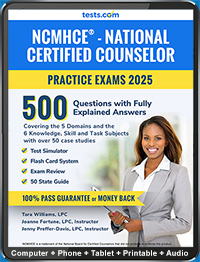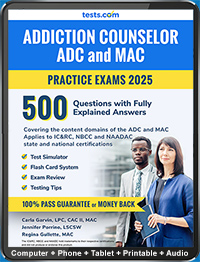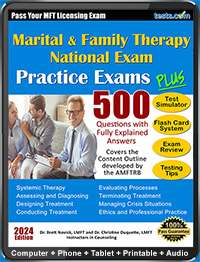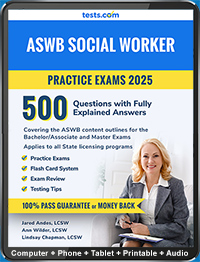NCE - National Counselor Exam Guide
Counselors can work in a variety of specialties and settings with a basic license, but certain national certifications, such as the National Certified Counselor and Certified Rehabilitation Counselor designations, demonstrate that a counselor has met additional requirements generally accepted as indicative of expertise in the profession.
National Certified Counselor
First offered in 1983, the National Certified Counselor is the premier credential issued by the National Board for Certified Counselors, an independent not-for-profit credentialing body for counselors. The National Counselor Certification not only verifies that a counselor meets certain professional standards, but the certification also can improve a counselor’s career prospects and provide access to valuable counseling resources.
According to the National Board for Certified Counselors, there are more than 75,000 National Certified Counselors worldwide. All of those individuals met rigorous certification standards that demonstrate professional counseling experience and expertise and a comprehensive educational background. Application materials are available at www.nbcc.org.
One component of the National Certified Counselor application process is the National Counselor Examination for Licensure and Certification, otherwise known as the National Counselor Exam (NCE). According to the NBCC, all 50 states, the District of Columbia and Puerto Rico use the NCE to certify their counselors.
The NCE is given in both a computer based format and a paper-and-pencil format depending on the state. Check your state board to see what test format they utilize. The NCE consists of 200 multiple-choice questions and is administered over a four-hour period.
National Certified Counselor candidates may take the NCE by scheduling an appointment at locations throughout the United States. It is offered twice a year in spring and fall. The National Certified Counselor application materials available on the NBCC website include a complete listing of examination sites.
The NCE content is general in nature and encompasses knowledge areas with which all counselors, regardless individual specialties, should be familiar. The exam covers the following six knowledge, skill and task domains:
- Professional Practice and Ethics
- Intake, Assessment and Diagnosis
- Areas of Clinical Focus
- Treatment Planning
- Counseling Skills and Interventions
- Core Counseling Attributes
The questions are aligned to the following CACREP Common Core Areas:
- Human Growth and Development
- Social and Cultural Diversity
- Counseling and Helping Relationships
- Group Counseling and Group Work
- Career Development
- Assessment and Testing
- Research and Program Evaluation
- Professional Orientation and Ethical Practice
Only 160 of the 200 test items count toward the NCE score. The other 40 items are being field tested to determine their potential for inclusion in future exams. A different version of the test is administered on each test date, and the passing score is determined by a modified Angoff procedure. That is, a panel of experts determines the number of answers which should be known by a majority of counselors, and that number is set as the passing score.
There is a late fee charged if the National Certified Counselor application materials are not submitted by a set deadline.
The NBCC also offers specialty certifications in three areas, for which the National Certified Counselor designation serves as a precursor:
- The Certified Clinical Mental Health Counselor (CCMHC) designation requires that the applicant pass the Examination of Clinical Counseling Practice, a 100-question test that assesses an individual’s general professional knowledge, including diagnosis, treatment and evaluation, among other areas.
- The National Certified School Counselor Examination, which consists of seven simulated counseling cases that measure specific School Counselor knowledge, and 40 multiple choice questions that determine general counseling knowledge, is necessary for the National Certified School Counselor (NCSC).
- The Master Addictions Counselor credential is based in part on results on the Examination for Master Addictions Counselors, a 100 multiple-choice item test that covers topics such as assessment, prevention and treatment planning.
Certified Rehabilitation Counselor
Rehabilitation counselors assist people with disabilities in a range of areas, from health care to vocational rehabilitation, in order to help those clients fully integrate into their communities and society at large. The Certified Rehabilitation Counselor designation shows that a rehabilitation counselor has achieved a high level of specialized education and training, is dedicated to the ethical practice of his or her craft and committed to continuing education and understanding current issues that affect the profession.
An independent, nonprofit organization, the Commission on Rehabilitation Counselor Certification maintains the internationally recognized rehabilitation certification program. The CRCC is the world’s largest rehabilitation counseling organization with more than 16,000 counselors currently certified and a total of more than 35,000 certified rehabilitation counselors since its inception in 1974. The majority of those counselors are in the US.
Certified Rehabilitation Counselors must have completed a master’s degree program and additional professional requirements. Rehabilitation counselors may be certified under one of six categories:
- A – Counselors who hold a master’s degree from a rehabilitation counseling program accredited by the Council on Rehabilitation Education (CORE) and have completed a 600-hour internship supervised by a CRC.
- B – Counselors who hold a master’s degree from a program not accredited by CORE who have either completed a 600-hour CRC-supervised internship and have a specified amount of acceptable employment experience.
- D – Counselors who hold a master’s in counseling that included specified graduate-level courses on various aspects of counseling and disabilities plus a certain amount of acceptable work experience depending on the nature of the coursework taken.
- E – Counselors who hold a doctorate in rehabilitation counseling, took courses in the specified areas completed the 600-hour internship or can substitute 12 months of acceptable work experience.
- G – Students currently in CORE-accredited master’s rehabilitation counseling programs who have completed at least 75% of their coursework by six weeks prior to the test date and have completed a 600-hour internship. These students must graduate from their program within 12 months of the application deadline date.
- K – Formerly certified rehabilitation counselors who want to restore an expired status.
A passing score on the Certified Rehabilitation Counselor exam is another requirement for the certification. The Certified Rehabilitation Counselor exam covers the following:
- Career Counseling and Assessment
- Job Development and Placement Services
- Vocational Consultation and Services for Employers
- Case and Caseload Management
- Individual Counseling
- Group and Family Counseling
- Mental Health Counseling
- Psychosocial and Cultural Issues in Counseling
- Foundations, Ethics, and Professional Issues
- Rehabilitation Services and Resources
- Healthcare and Disability Systems
The Certified Rehabilitation Counselor exam consists of 175 multiple-choice questions, and the test is administered on a computer at Prometric Test Centers throughout the United States. The test may be taken during any of the three eight-day windows scheduled each year. Examinees are encouraged to plan a four-hour window for taking the test, which includes time for checking in and a practice session to become familiar with the computer program, in addition to the three-and-a-half hours allotted for the Certified Rehabilitation Counselor exam itself.
For scoring purposes, the Certified Rehabilitation Counselor exam is divided into two parts. One portion measures counseling-related knowledge, and the other tests comprehension of rehabilitation and disability issues. Candidates must achieve a passing score on both parts in order to pass the overall examination.
Planning to take the National Counselor Exam or the Certified Rehabilitation Counselor Exam? Find resources in our Counselor Exam Directory.








